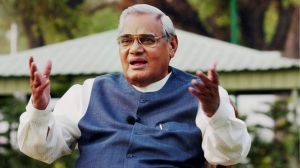Tech tycoon Azim Premji rides high on India8217;s electronics-wave
BANGALORE, DEC 25:In the mid-1960s, Azim Hasham Premji quit Stanford University, his degree in engineering unfinished, and rushed to the a...

BANGALORE, DEC 25:In the mid-1960s, Azim Hasham Premji quit Stanford University, his degree in engineering unfinished, and rushed to the aid of his family8217;s ailing vegetable oil business following the death of his father. Thirty-three years later, Premji8217;s born-again Wipro Ltd 8211; now better known for its computer software services 8211; has topped India8217;s market capitalisation chart. By the end of trading at the Bombay Stock Exchange on Friday, Wipro was worth a cool 12.1 billion. That toppled long-time leader Hindustan Lever Ltd, the Indian unit of Unilver Plc, which ended the day with a market capitalisation of 11.9 billion.
The market8217;s voracious appetite for infotech stocks has also made Premji a richer man. The 75 per cent stake held by the tech tycoon and his trusts was worth about 9 billion when the two-rupee share ended at Rs 2,292.95 52.71 on Thursday. Wipro extended its gains on Friday despite an overall market decline, rallying to a high of Rs 2,440. Premji, 53, can now also reclaim the mantle of richest Indian 8211; declared by Forbes magazine earlier this year 8211; from US-based tech-entrepreneur Gururaj Deshpande, the founder of Sycamore Networks Inc.
The market-cap league, as Premji has himself acknowledged, is just a notional indication of a company and its owners8217; worth, which can soar or plummet on fickle investor sentiment.
But the underlying message is clear: the computer software sector is clearly the leader among a handful of sectors that have been fuelling a spectacular rise in India8217;s stock markets.
Facing challenges: quot;We thank our investors for recognising Wipro,quot; the media-shy Premji said in a faxed statement on Thursday. quot;This recognition and its subsequent expectation from us, indeed pose a challenge.quot; Analysts say that taking on challenges 8211; and exceeding expectations 8211; has been the hallmark of a man who does not have a reserved parking space outside his office in the southern city of Bangalore and prefers to fly economy class.Wipro8217;s success is the reward of a long journey down a road that Premji chose for Western India Vegetable Products Ltd 8211; as it was known until 1977 8211; after his return from Stanford. Having diversified from vegetable oil into making hydraulic cylinders in the early 1970s, Premji embraced information technology in 1980 because he thought IBM Corp8217;s withdrawal from India would leave a market gap.
The Wipro Infotech group started manufacturing some of India8217;s first personal computers and also moved into offering software services for global clients who had started eyeing Indian firms for their huge cost advantage.Premji did not put all his eggs into the infotech basket. He also carved out a successful toilet soaps unit, a childcare products unit, a lighting products unit and a finance company. The company launched a joint venture with GE Medical Systems, a unit of General Electric Co, to make medical diagnostic instruments; another with British Telecom which was ended in 1998; and a third with Taiwan8217;s Acer International to make PCs which was dissolved last April. Recognised today as a quality software services firm with its core strengths in telecommunications and networking, Wipro has a client list that includes leading global firms such as GE, Lucent Technologies Inc, Nortel Networks, Alcatel and Cisco Systems.
An entrepreneur, not a technologist: Earlier this year, Wipro suffered an exodus of top software personnel who joined the bandwagon of those riding India8217;s venture capital funding boom to start their own firms. Premji, who prides himself on recruiting the best talent, was unmoved and appointed a young, former Wipro-GE employee, Vivek Paul, as the new head of his software unit. Today, one-circumspect analysts unhesitatingly admire the move as Paul spearheads Wipro8217;s continued March with more and more new business orders.
And the secret, as Premji himself unknowingly admitted at a recent lecture, is that he is not a technologist: quot;I am not a technologist but an entrepreneur in the area of technologyquot;. Investors seem to think that is more than enough.
- 01
- 02
- 03
- 04
- 05































